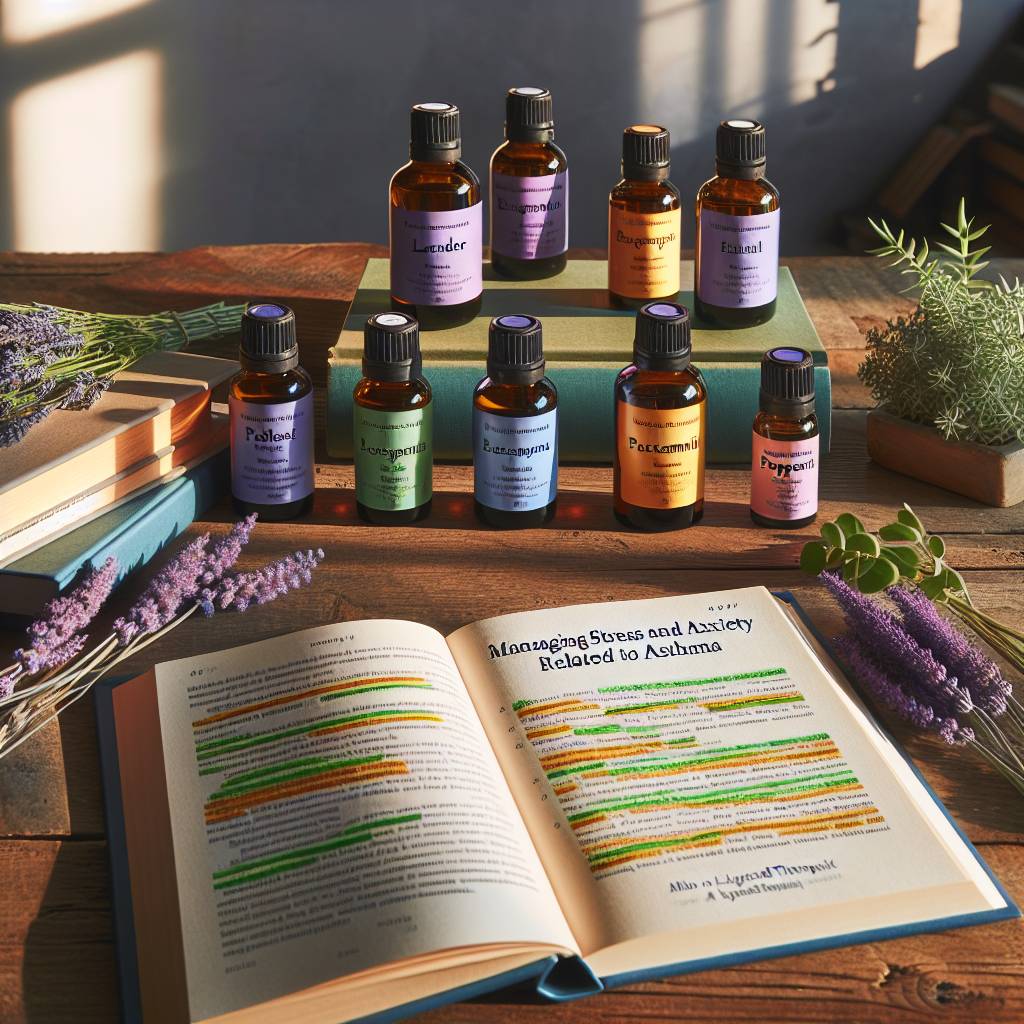Can essential oils help with asthma-induced stress and anxiety?
Yes, essential oils can help with stress and anxiety caused by asthma. They offer a natural way to relax the mind and reduce feelings of stress. Lavender, chamomile, and peppermint are popular choices that many find soothing. However, it’s important to use them safely and avoid any oils that might trigger asthma symptoms.

What Are the Benefits of Essential Oils for Asthma-Induced Stress and Anxiety?
Essential oils have been recognized for their calming and soothing properties, which can be particularly beneficial for individuals dealing with asthma-induced stress and anxiety. The natural compounds found in these oils can help to relax the mind, reduce tension, and promote a sense of well-being. This is crucial for asthma patients as stress and anxiety can trigger or worsen asthma symptoms.
Moreover, essential oils like lavender, chamomile, and bergamot have been shown to support better sleep patterns. Good sleep is vital for managing stress levels effectively. By enhancing sleep quality, these oils indirectly contribute to reducing the frequency of asthma attacks triggered by stress or anxiety.
Which Essential Oils Are Most Effective for Reducing Stress and Anxiety in Asthma Patients?
Lavender oil is widely regarded as one of the most effective essential oils for alleviating stress and anxiety. Its calming scent has a direct impact on the central nervous system, promoting relaxation and reducing feelings of anxiety. This makes it an excellent choice for asthma patients who often experience heightened levels of stress.
Bergamot oil is another powerful option that has been studied for its ability to lower cortisol levels (the stress hormone) in the body. Its citrusy aroma is uplifting yet relaxing, helping to balance emotions during stressful times. For those with asthma, incorporating bergamot oil into their relaxation routine can be a helpful way to manage stress-related symptoms.
Boost your respiratory health with essential oils. Find out which oils help the most and how to use them safely.
How Do Essential Oils Interact with the Body to Affect Stress and Anxiety Levels?
When essential oils are inhaled through aromatherapy, their molecules enter the lungs and then get absorbed into the bloodstream. They eventually reach various parts of the brain that control emotions, including areas like the limbic system. This interaction can trigger immediate changes in mood, often leading to reduced feelings of stress and anxiety.
Besides inhalation, essential oils can also be absorbed through the skin during massages or baths. Once they penetrate the skin, they work by stimulating various biological factors that influence mood and emotions. For instance, some oils can increase serotonin production—a neurotransmitter associated with happiness—thereby helping alleviate feelings of anxiety.
Can Using Essential Oils Directly Impact Asthma Symptoms?
While essential oils are primarily used for managing stress and anxiety among asthma patients, some studies suggest they might also have direct benefits on asthma symptoms themselves. Eucalyptus oil, for example, contains eucalyptol which helps break down mucus; this can potentially aid in clearing airways making breathing easier for those with asthma.
However, it’s important to note that while certain essential oils may offer relief from specific symptoms or act as supportive therapy alongside conventional treatments; they should not replace prescribed medications or treatments advised by healthcare professionals. Always consult with a doctor before incorporating any new treatment into your regimen if you have asthma.
| Essential Oil | Benefits for Asthma-Induced Stress and Anxiety | How to Use |
|---|---|---|
| Lavender | Calming, reduces anxiety and stress, may aid in better sleep. | Inhalation through a diffuser or applying diluted oil on the skin. |
| Eucalyptus | Can help clear the airways, making breathing easier and reducing panic. | Inhalation via steam inhalation or diffuser. Do not apply undiluted directly on the skin. |
| Peppermint | Might relieve blocked airways and coughs, potentially easing breathing difficulties. | Dilute with a carrier oil and apply to chest, or inhale through a diffuser. |
| Bergamot | Possesses calming effects, can reduce nervous tension and stress-related symptoms. | Inhalation through a diffuser or applying diluted oil on the skin. Avoid sun exposure after application. |
| Frankincense | Known for its ability to promote relaxation, improve mood, and support overall well-being. | Inhalation via a diffuser or direct inhalation from a bottle. Can also be applied topically when diluted with a carrier oil. |
| Roman Chamomile | Soothes nervousness, eases anxiety, and promotes relaxation without sedative effects. | Inhalation through diffusion or topical application in dilution for calming effects on the mind and body. |
| Lemon | May uplift mood, reduce feelings of anxiety and depression that can accompany asthma attacks. | Inhale directly from the bottle or use in a diffuser. Dilute with a carrier oil if applying topically to avoid photosensitivity. |
What Are the Best Methods for Applying Essential Oils to Alleviate Asthma-Induced Stress?
One effective way to use essential oils for asthma-induced stress is through aromatherapy. This involves inhaling the scent of essential oils, which can be done using a diffuser or by simply adding a few drops of oil to a bowl of hot water and breathing in the steam. Aromatherapy helps in calming the mind and reducing stress levels, making it easier for asthma patients to manage their symptoms.
Another method is topical application, where essential oils are diluted with a carrier oil and then applied directly to the skin. Massaging the oil mixture onto the chest, back, or feet can provide a soothing effect and help ease breathing difficulties associated with stress. It’s important to conduct a patch test before full application to ensure there’s no allergic reaction.
Are There Any Risks or Side Effects Associated with Using Essential Oils for Asthma or Anxiety?
While essential oils are natural, they’re not without risks, especially for individuals with asthma. Some people may experience allergic reactions or skin irritation when using certain oils topically. Additionally, inhaling strong scents can sometimes trigger asthma attacks rather than alleviate them. Therefore, it’s crucial to start with small amounts and observe how your body reacts.
Pregnant women and children should use essential oils with caution. Consulting a healthcare provider before incorporating essential oils into any treatment plan is always recommended to avoid potential side effects or interactions with other medications.
How Can You Incorporate Essential Oils into Your Daily Routine for Managing Asthma-Related Stress?
Incorporating essential oils into your daily routine can be simple and enjoyable. Starting your day with an aromatherapy session during morning meditation or yoga can help set a positive tone while keeping stress at bay. Placing a diffuser in your workspace or living area can also provide continuous stress relief throughout the day.
For nighttime relaxation, adding a few drops of lavender or chamomile oil to your bathwater can promote better sleep while reducing anxiety levels. Keeping a rollerball bottle filled with your favorite calming blend on hand allows for quick application whenever you feel stressed or overwhelmed during the day.
Final Thoughts
Essential oils offer a natural way to manage asthma-induced stress and anxiety but should be used wisely considering their potential risks. By choosing suitable application methods and being mindful of individual reactions, these aromatic compounds can become valuable tools in alleviating discomfort associated with asthma.
Remember that while essential oils can complement traditional asthma treatments by easing stress-related symptoms, they should not replace prescribed medications or professional medical advice. Always consult healthcare professionals when integrating new elements into your health regimen.






